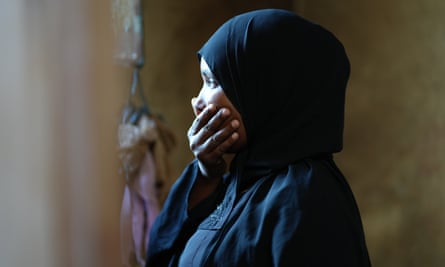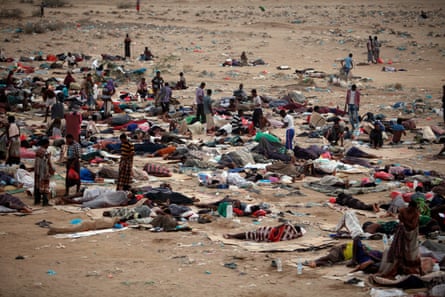The number of African migrants stranded in Yemen, many of whom endure “horrifying and brutal” violence while trapped there, is reaching critical levels, according to international NGOs and civil society organisations based in the Arab state.
The International Organization for Migration (IOM) put out a warning this week about the humanitarian crisis in Yemen, leading a call for urgent funding to support the “safe and voluntary return of migrants to their countries of origin”.
The intervention follows a number of fatal boat journeys last month from Djibouti, a major transit point for people leaving the Horn of Africa, many of whom are attempting to get to Saudi Arabia – the Arab world’s largest economy and the world’s third most popular destination for migrants.
“As migration flows continue to surge, the demand for safe and dignified return options for migrants has reached critical levels,” said Matt Huber, IOM’s acting chief of mission in Yemen. The IOM estimated there were 308,000 migrants in the country.
Mohammed Al-Selwi, the executive director of Yemeni rights group Mwatana for Human Rights, said the vast majority of Africans arriving in Yemen regarded it as a transit stop, yet many ended up stranded there.
“Here, they are subjected to horrifying and brutal violations by the feuding parties dividing Yemen,” he said. “Forms of abuse include murder, mutilation, forced disappearance, arbitrary detention, torture and sexual violence.” Traffickers on both sides of Bab al-Mandab, the strait between Djibouti and Yemen, are accused of human rights violations.
Ayan Ahmed was 16 years old when fighting in Ethiopia’s northern state of Tigray broke out three years ago between the government and the Tigray People’s Liberation Front. Her home town of Harar, 200 miles east of Addis Ababa, was far from the violence, but the impact still reached her: in a span of a year or so, she lost both parents to common illnesses which she said were fatal because the war had damaged the country’s health system, limiting access to treatment. She was then thrust into the care of relatives – all members of the Oromo tribe, Ethiopia’s largest ethnic group but a target of discrimination.
Poverty, unrest and oppression meant the teenager was easily lured by smugglers’ promises of a better life in Saudi Arabia. Ahmed had no idea what awaited her on that journey.
When she arrived in Djibouti, eight smugglers – some of whom were from her tribe– “held us captives up a mountain in Tadjoura for three months, demanding ransom. These were the bleakest days of my life,” she said. “Food was given three times a week. We were beaten, terrorised, violated – some women were even raped.”

According to the IOM, the number of African immigrants arriving in Yemen by boat rose to 97,210 in 2023, up from 73,233 in 2022 and 27,693 the year before, and closer to the 138,213 recorded arrivals in pre-Covid 2019. As new frontlines open and worsening economic woes add strain on African nations, more immigrants – the majority of whom are Ethiopians – are falling victim to traffickers.
It took Ahmed five months to get to Yemen, “where more abuse awaited us”, she told the Guardian. “I saw people die because of starvation and abuse by people who promised us safety.” Ahmed said she was spared the worst abuses because her brother sold some of their father’s land to pay the ransom demanded by the smugglers.
The now 19-year-old never made it to Saudi Arabia. “My niece and I were among dozens held up that mountain, who were put on a boat and sailed towards Bab-el-Mandeb for nine hours. Once we arrived in Yemen, we were abandoned to fend for ourselves. We navigated cluelessly for weeks between villages and towns, without any food or resources, until we made it to Aden,” she said.
After three years of saving up the 1,000 riyals (£210) for the journey, followed by months of abuse, Ahmed is now working in an Ethiopian restaurant in Aden, south Yemen, miles away from her Saudi dream.
Yemen was already one of the poorest countries in the world before a 10-year civil war gave rise to one of the world’s worst humanitarian crises, with nearly 4.5 million internally displaced people and more than half its 33.7 million population in need of aid.

Nadia Hardman, a researcher at the Refugee and Migrants Rights Division of Human Rights Watch, said there had been “multiple cases of African women who have been impregnated as a result of rape they’ve endured while making the journey from the Horn of Africa to Yemen”, a path the IOM describes as “one of the most complex and dangerous maritime routes globally”.
For those who keep going towards Saudi Arabia, the risks are grave. Last year, Human Rights Watch reported thatSaudi border guards killed hundreds of Ethiopian migrants and asylum seekers, including women and children, who tried to reach its soil between March 2022 and June 2023. According to the report, guards used explosive weapons to kill many migrants and shot others at close range.
This story is published in collaboration with Egab
Source: theguardian.com


